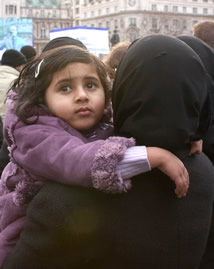Islam Moves West, Religious Change in the First and Second Generations, published this month in the Annual Review of Sociology, tracks research on the children and grandchildren of Muslim immigrants and found that they mainly stayed with their parent’s faith and remain religiously committed to a similar degree.
David Voas, Professor of Population Studies at ISER, and Fenella Fleischmann from the European Research Center on Migration and Ethnic Relations at the Utrecht University, have analysed recent studies of the religious belief, identity and practice of Muslims who settle in the West, and their subsequent generations.
Immigrants usually assimilate and absorb the culture of society around them in their new country.
That Muslim immigrants – and their children – appear to remain religious despite the prevailing culture of their new country, when compared to other immigrant groups, could be attributed to three possible influences.
“Firstly, the wide gulf between the customs of the sending and receiving societies. The West can seem alarmingly decadent to Muslims with traditional values. There is a natural urge to try to assert old forms of social control, with discipline being increased rather than relaxed.
Secondly, some children of Muslim immigrants look for a ‘real Islam’ that is free from the defects they see in the parental culture. Instead of blaming the religion for troubles in their families countries of origin, not to mention their own upbringing, they attribute all ills to local customs.
Finally, the inescapable pressure of contemporary Western suspicion of Islam. Muslims currently encounter far greater hostility than members of any other religious group, although Catholic and Jewish immigrants faced similiar prejudice in the past. There is a natural tendency to react by upholding what is being disparaged."
They conclude, however, that is very likely that there will be adaptation over time and subsequent generations. Professor Voas explains,
“We expect that Muslim immigrants will eventually lose their distinctiveness over successive generations, just as has happened with other immigrant groups.”
Listen to ISER’s podcast interview with Professor David Voas about this research.
<%= clr %>
<%= clr %>
